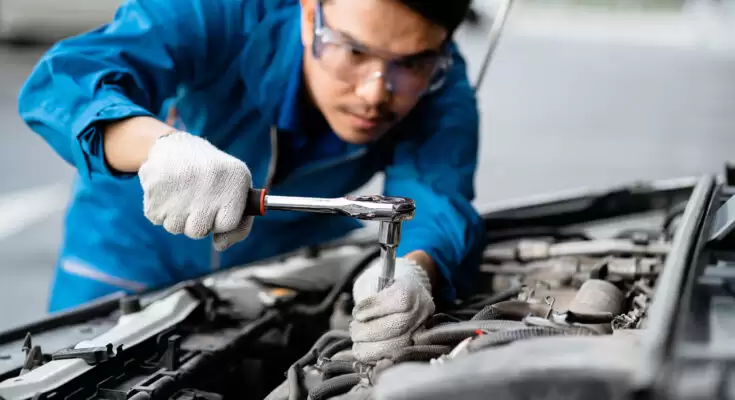Your car is your reliable companion, always there for you when you need it. But what happens when your car doesn’t work properly? There could be many reasons for this, but one common issue is a malfunctioning alternator.
Your car’s alternator is an important component in your vehicle’s electrical system, responsible for charging the battery and powering various applications. Without it, you could experience problems that range from minor inconveniences to major safety hazards. So, how can you tell if your alternator needs some TLC? Read on to find out.
Warning Lights on the Dash
One of the first signs that your car’s alternator may be in trouble is warning lights on the dashboard. The most common light you’ll see is the battery warning light, which looks like a car battery and typically glows a bright red or yellow. If the light is bright, it means the alternator is not charging correctly, and you should seek assistance from a trusted mechanic right away.
Warning lights are not to be ignored, especially when it comes to your car. These warning lights serve as an early indicator that something is wrong with your vehicle and requires attention. Ignoring these warning signs could lead to more significant issues down the road, including potential breakdowns or even accidents. If you see a battery warning light on your dashboard, don’t wait to take action and get your alternator checked out. Be sure that you inform your mechanic about any warning lights you see, as they will be able to figure out the problem much easier that way.
Dim Headlights
Another sign of a potential alternator issue is dim headlights. Headlights are powered by your car’s electrical system, and a worn-out alternator can’t supply the necessary current. If your headlights are appearing dim or flickering, it’s probably time to check your alternator.
If your headlights die while you’re driving, it’s important to stay calm and pull over to a safe location as soon as possible. It may be tempting to keep driving with only your daytime running lights or emergency flashers on, but this can be dangerous for both you and other drivers on the road. Once you’ve safely pulled over, you can call for roadside assistance or arrange for a tow to a repair shop, such asElite Automotive. It’s important not to try and continue driving with no headlights, as this could lead to accidents and put yourself and others in danger.
Strange Sounds
Unusual sounds coming from your car could indicate a problem with the alternator system. A grinding sound is typically an excellent indicator of a bad alternator bearing. A high-pitched whining noise could also indicate problems with the belt or electrical connections. In any case, any sort of odd noise should not be overlooked.
It’s important to know what normal noises your car makes so that you can differentiate them from any strange sounds. For example, a humming noise coming from the engine is normal while driving, but a grinding or whining noise could be a sign of an alternator issue. Regularly listening for changes in your car’s noises and addressing any unusual sounds can help prevent more significant problems down the line.
Battery Issues
Your car’s battery depends on the alternator to remain fully charged so that it can work correctly. If you find yourself frequently needing to jump-start your car or when your battery dies for no apparent reason, it’s a sign your alternator isn’t functioning correctly, and it’s a good idea to have it checked.
In addition to needing frequent jump-starts and dying unexpectedly, there are other signs of battery issues that may indicate a problem with your alternator. These can include slow cranking when starting your car, low voltage readings on a voltmeter, or an illuminated battery light even after replacing the battery.
Electrical Failures
The electrical systems in modern-day cars are intricate systems, and with a poor alternator, these systems will fail. Signs include problems with power windows, power seats, a malfunctioning radio system, and malfunctioning dashboard gauges. While this may not be exclusive to the alternator, it’s worth investigating to rule out the alternator as a cause.
In addition to the specific electrical issues mentioned above, there are other signs of potential alternator problems that you should keep an eye out for. These can include flickering dashboard lights, dim interior lights, and a weak air conditioning system. Any issues with your car’s electrical systems should not be ignored and should be investigated by a professional mechanic. The last thing you want is to have to find acar accident attorneyfor a problem that could easily be fixed by a mechanic.
Burning Smells
A burning smell around the engine or alternator might also indicate a damaged alternator. When the alternator begins to fail, it may overheat and emit a burning rubber or electrical smell. This can be a serious safety issue and should not be ignored.
If you smell a burning odor in your car, it’s essential to take immediate action. Pull over to a safe location, turn off the ignition, and allow the engine to cool down. Do not attempt to drive the vehicle until the issue has been resolved by a professional mechanic. Continuing to drive with a damaged alternator can put you at risk for fires or other hazardous situations. It’s crucial to address any burning smells in your car promptly to ensure the safety of both yourself and others on the road.
Keeping an eye on the signs that your car’s alternator is failing can save you time, money, and stress in the long run. Ignoring the warning signs could lead to a major breakdown and put your safety at risk. If you notice any of these signs, take your car to a professional auto shop to determine if your vehicle’s alternator needs repair or replacement. With proper maintenance, you can extend the life of your car’s alternator and keep your car running smoothly.
